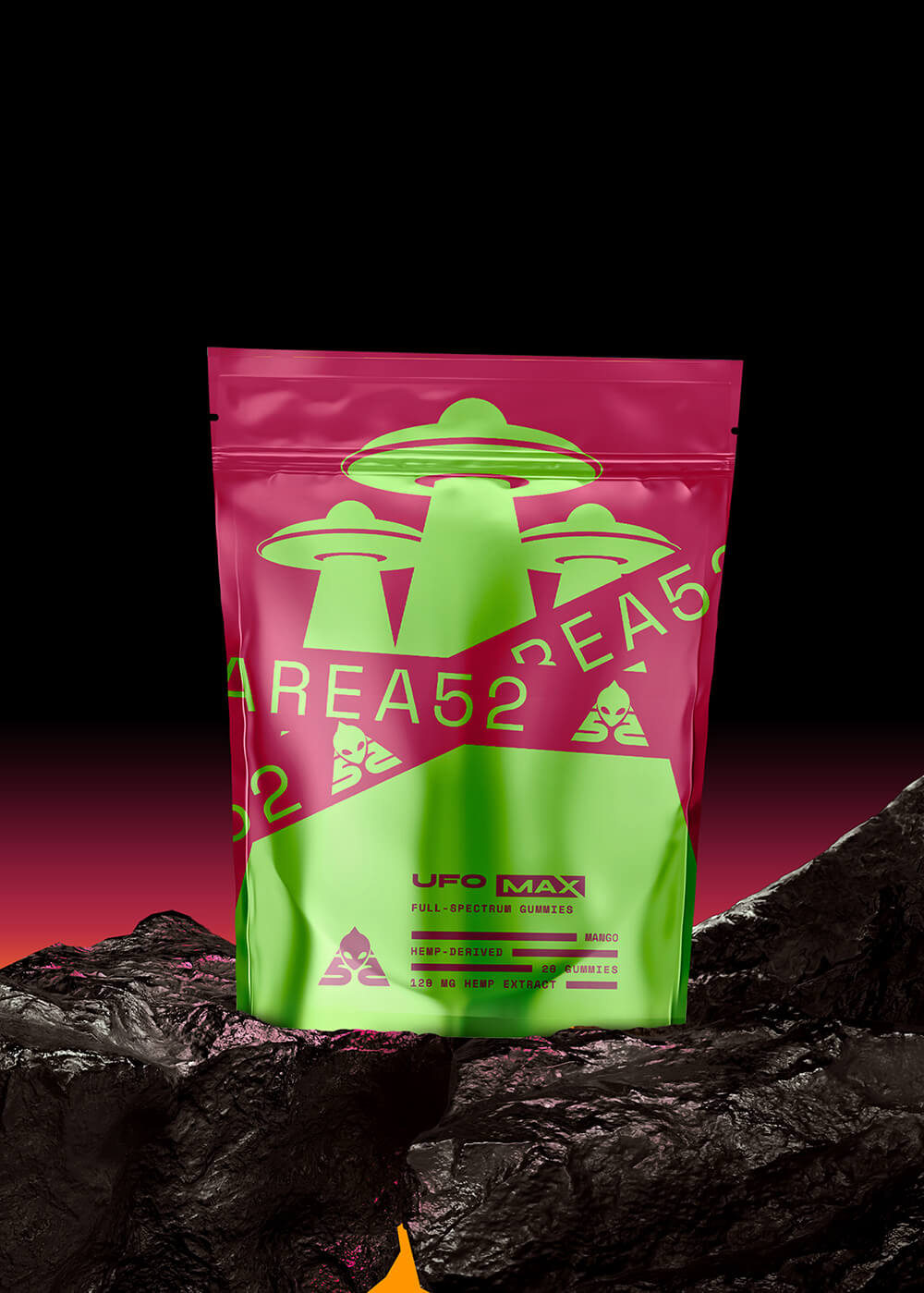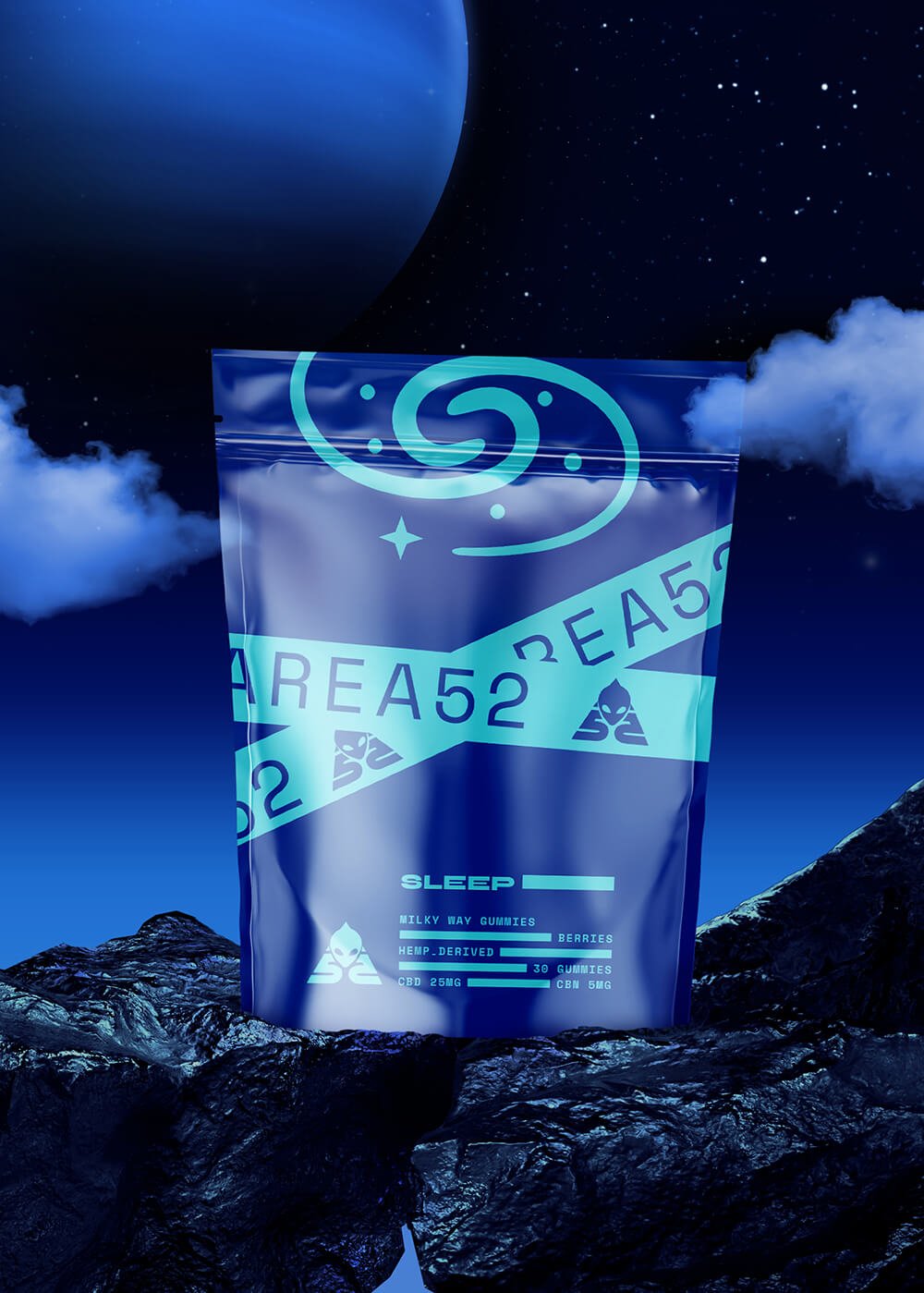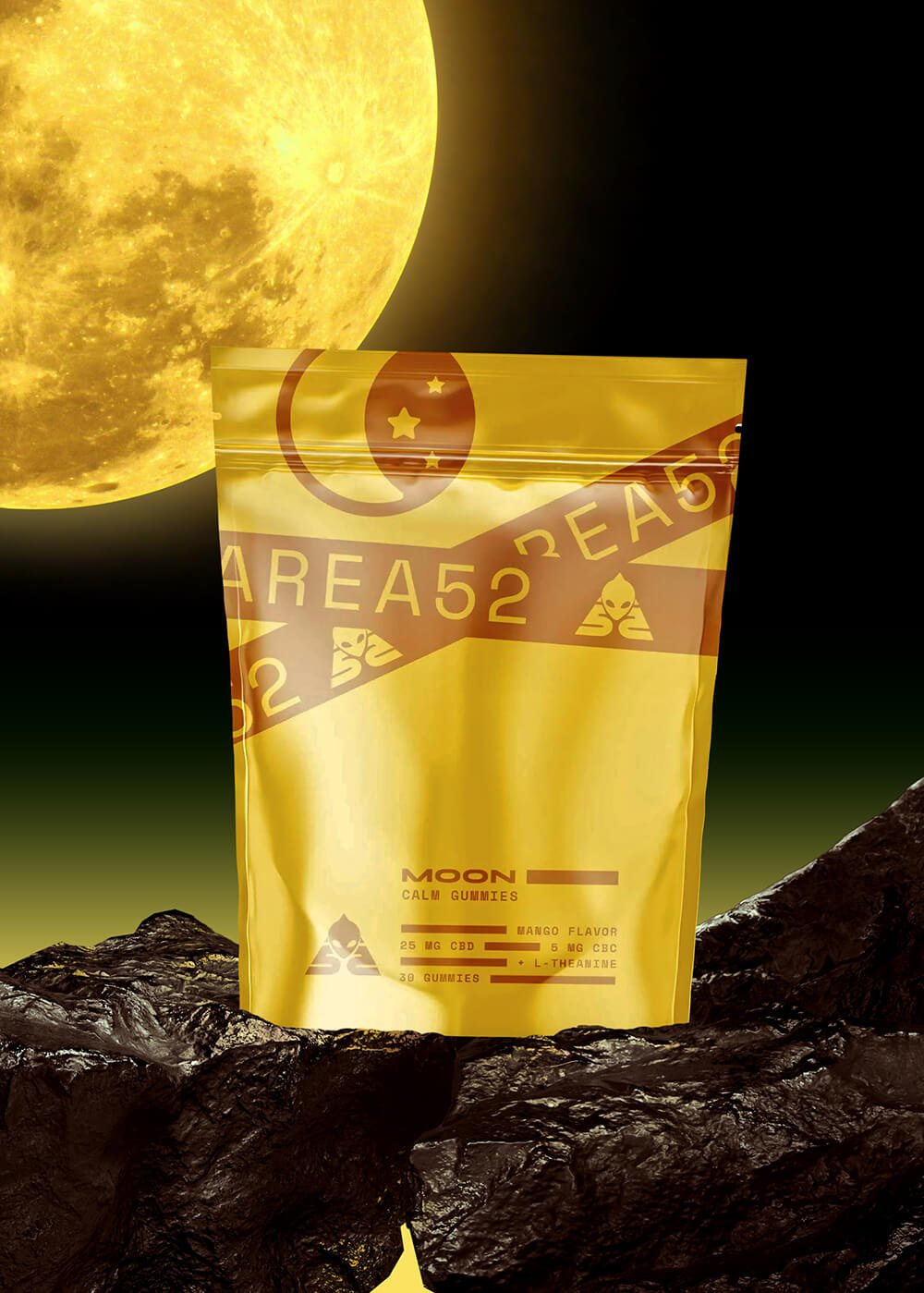Delta 10 THC vs. CBD: What Are the Differences and What Can They Do?
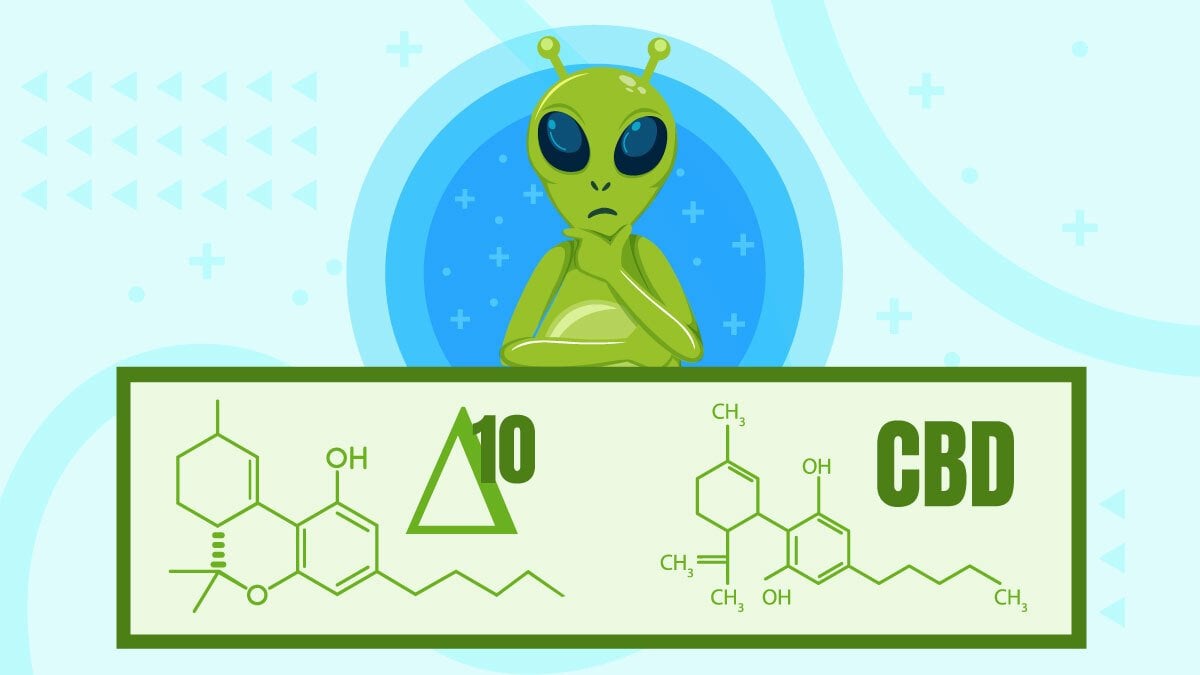
By now, you’ve probably already heard about CBD. For a while, CBD was the king — but now there are dozens of hemp-derived cannabinoids touted as the “next best thing.” Delta 10 THC is one of these molecules.
Here, we’ll explore what makes delta 10 THC and CBD similar and what makes them different. We’ll also cover why you may want to consider taking both together.
Comparing Delta 10 & CBD:
| Delta 10 THC | CBD | |
| Side Effects | Dry mouth, the “munchies,’ red eyes, a “high” | Dry mouth, lethargy, diarrhea, reduced appetite |
| Dose | 10-50 mg per dose | 20-40 mg per dose |
| Legality | Federally legal, legal in most states if hemp-derived | Federally legal, legal in most states if hemp-derived |
| Psychoactive? | Yes, mildly | No |
| Consumption Methods | Tinctures, gummies, vape | Tinctures, extracts, capsules, flower, gummies, vape |
| Will I Fail a Drug Test? | Probably | No, as long as it has legal amounts of THC |
Why People Are Combining Delta 10 & CBD Together
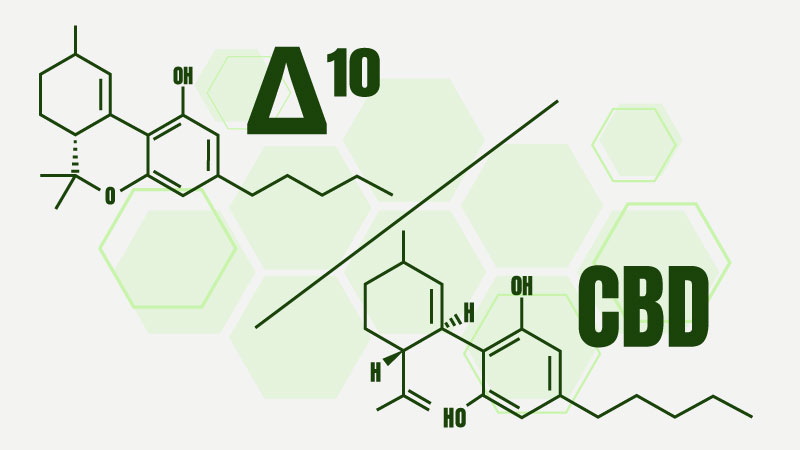
There’s a lot of talk these days about stacking delta 10 with CBD products — and there are some good reasons for this.
The main reason is that delta 10 is a slightly more invigorating cannabinoid than conventional THC. This makes it a great supplement for use during the day, while at work or university, or before a gym sesh.
If you’ve ever had too much marijuana or THC, you’ll probably be familiar with the feeling of taking too much. Your heart beats faster, you may experience sweaty palms, and you feel uncomfortable in social situations. It can be quite uncomfortable.
The reason so many people take CBD with their delta 10 is because of its relaxing effect. CBD seems to tether the delta 10 users down to Earth. You feel the motivation but without the anxiousness.
Because of how similar the doses are between delta 10 and CBD, most people take a 1:1 equivalent. For every mg of delta 10, they’ll use roughly 1 mg of CBD along with it.
This isn’t an exact science. If you’re using delta 10 as a vape, and have some CBD oil kicking around, the general idea is to take a dose of CBD just before or just after you start hitting the vape pen (or vice versa).
What Is Delta 10 THC?
Delta 10 THC, like delta 8 THC, is an isomer of delta 9 THC (or THC). These compounds have the same chemical makeup but with different arrangements. Because of this, their effects are unique enough to make them distinct yet still close enough to be familiar.
Cannabis naturally produces all three but in varying amounts. Marijuana contains much higher amounts of THC than hemp (legally, hemp has to contain less than 0.3%), while delta 8 and delta 10 are byproducts and occur in minuscule amounts.
These amounts are so small that their extraction requires a special process; otherwise, there would never be enough to go around.
For efficiency, CBD is extracted from hemp; then chemicals are added to facilitate a specific type of reaction called “isomerization.”
Sometimes there are some pretty harsh chemicals used to produce this reaction. In order to be safe to use, these chemicals have to be entirely removed from the final product — the main reason it’s so important to make sure they’re third-party tested.
What Are The Effects of Delta 10 THC?
Delta 10 is psychoactive but far less potent than delta 9 and even milder than delta 8. Its effects make it popular for people who want to get high but also have shit to do; the experience is often reported to feel very “creative and uplifting.”
It’s comparable to Sativa strains like Sour Diesel, while delta 8 is reminiscent of Indica strains; CBD isn’t psychoactive at all but has calming effects like Indicas.
Learn More: Delta 8 THC vs. Delta 10 THC: What Are the Key Differences?
What Is CBD?
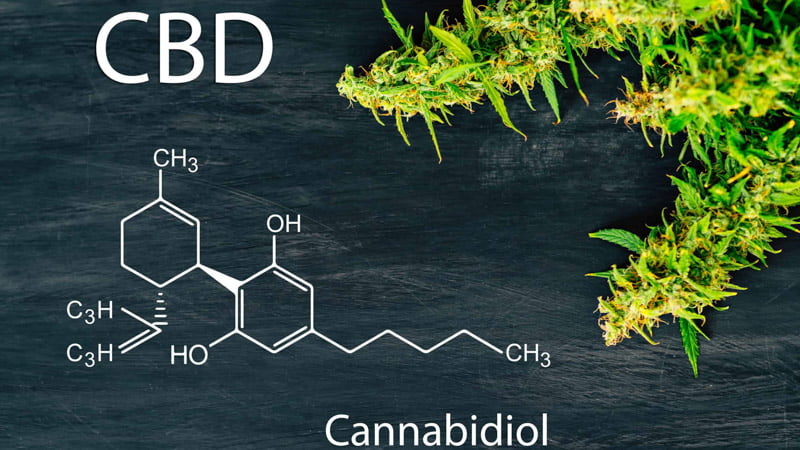
Cannabidiol, or CBD, is one of the most abundant cannabinoids in cannabis, falling alongside delta 9 THC and CBN.
As such, it has much more research surrounding it, whereas other cannabinoid research is still in its infancy.
Of course, that’s not saying much — CBD still isn’t FDA-approved and has a lot of hurdles to overcome. However, it won a significant victory when the FDA approved Epidolex, a prescription drug with CBD used in treating rare forms of epilepsy.
For now, people rely on limited knowledge and anecdotal evidence when deciding how to use it. Despite its safety profile, some states require a medical card for CBD or have other restrictions overseeing its use, but for the most part, it’s easily accessible.
It’s much easier to find than delta 10, partly because CBD extraction is less complicated than it is for other cannabinoids. Manufacturers usually use an alcohol solution or supercritical CO2 extraction to pull it out of hemp plants.
This end product usually needs further refining if the goal is to get a CBD isolate. Otherwise, other cannabinoids are left in the end product, creating full-spectrum (contains other cannabinoids) or broad-spectrum (everything but THC) extracts.
What Are the Effects of CBD?
Legally, CBD has to be extracted from hemp (less than 0.3% THC). Most CBD products don’t have any remaining THC, but even full-spectrum has such minimal amounts that you won’t feel any psychoactive effects.
Instead, CBD tends to have relaxing, calming effects that are mainly focused on the body. The body feels relaxed, and the mind feels calm.
Delta 10 vs. CBD: How Does It Work?
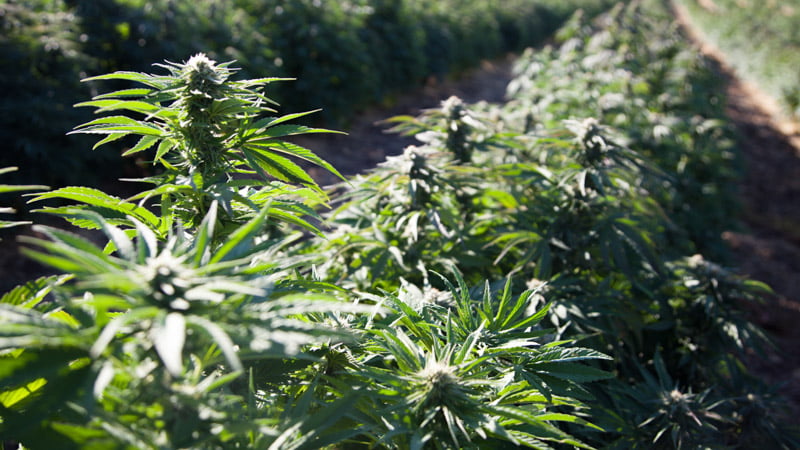
There are over 140 phytocannabinoids in cannabis, most untested. Cannabinoids affect the ECS in one way or another. Many of them, like THC, delta 8, and delta 10, bind to receptors.
CBD doesn’t bind to receptors but interacts with them somehow (still undetermined).
To summarize, the main difference in how CBD and delta 10 THC work comes down to the action at the ECS receptors. Delta 10 activates them while CBD merely “modulates” them.
Delta 10 & the ECS
There’s very little research on delta 10 specifically, but it binds to CB1 and CB2 receptors just like delta 8 and delta 9.
By binding to the CB1 receptors, these cannabinoids cause physical and mental changes that we call a “high.”
The research is still out on what else this binding might do.
CBD & the ECS
CBD and THC have an interesting relationship — CBD is like the responsible friend that keeps THC from being too crazy.
There’s a theory (called the entourage effect) that cannabinoids and terpenes work better together by boosting and altering each other’s effects, but this seems more pronounced with CBD and THC.
CBD might minimize the psychoactive effects of THC, reducing the anxiousness common with its use.
As mentioned, CBD doesn’t seem to bind to the ECS receptors unless there’s one we haven’t discovered yet. It influences them somehow, possibly by preventing them from breaking down, but researchers haven’t determined for sure.
CBD is quickly absorbed and easily passes the blood-brain barrier, making it extremely bioavailable.
Delta 10 vs. CBD: What Does the Research Show?
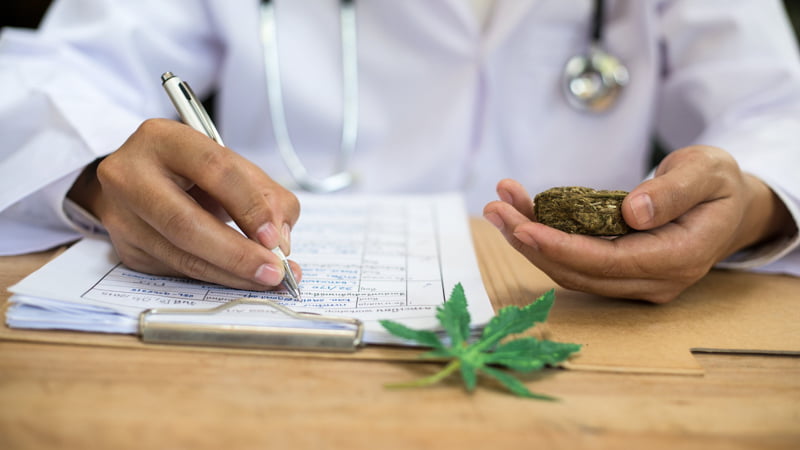
Decades of regulations and restrictions made it difficult to study cannabis to any serious degree prior to 2012.
Now we see a snowball effect as more studies take place, and each one reveals something needing an in-depth look.
Delta 10 vs. CBD: Side Effects
Overall, cannabis products appear to be safe — but that doesn’t mean the plant or its derivatives are without side effects.
What Are the Side Effects of Delta 10 Side?
THC is well-tolerated, even with adverse effects like anxiousness and lethargy. Delta 10, since it’s so much milder than THC, has similar effects but to a much lesser degree.
The most common side effects of delta 10 THC include:
- Dry mouth
- Red eyes
- The “munchies”
- Psychoactivity
What Are the Side Effects of CBD?
CBD rarely causes an issue for people, has low toxicity, and raises very few safety concerns.
The most common side effects of CBD include:
- Low blood pressure
- Dry mouth
- Diarrhea
- Lack of desire to eat
- Weight loss or gain
Delta 10 vs. CBD: How Do You Use It?
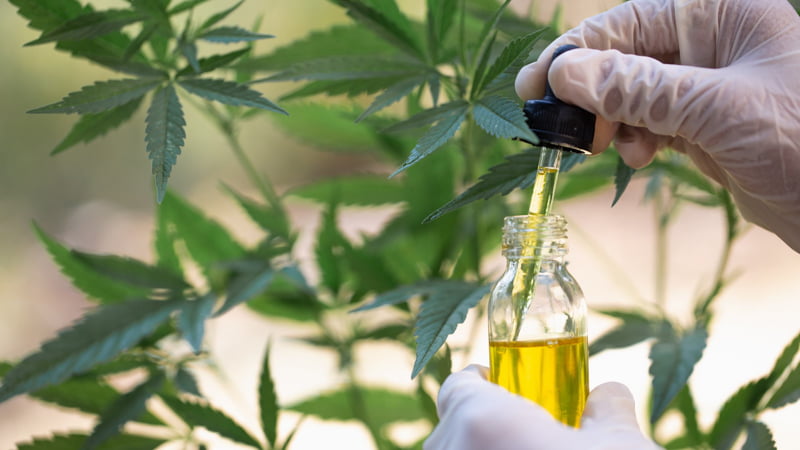
There are many ways to take delta 10 and CBD, but CBD has even more options.
The most common ways to take them are gummies or other edibles, vapes, or tinctures; some companies offer a wide selection of products and flavors for each of these categories.
You can even find CBD gum, CBD chocolate, or CBD cigarettes.
When deciding how much to take, your tolerance, weight, delivery method, and comfort with these products all come into play. You also need to consider hydration, if you’ve eaten, and what responsibilities you have to fulfill (for example, driving, working, or taking care of small children).
It’s always best to start low and increase the amount as needed.
Interestingly, delta 10 and CBD have identical doses (for most people). The threshold dose (minimum dose before effects are noticed) is around 10 mg. Most people take between 20 and 30 mg, but some prefer high doses of up to 100 mg.
Common Delta 10 Doses
- Low dose: 10 mg – 20 mg
- Medium dose: 20 mg – 50 mg
- High dose: 50 mg – 100 mg
Common CBD Doses
- Low dose: 10 – 20 mg
- Medium dose: 20 – 50 mg
- High dose: 50 mg – 100 mg
Delta 10 vs. CBD: Legality
Both CBD and delta 10 THC can be made from hemp and are therefore legal as per the federal US government.
However, some local state laws contradict this and have moved to ban psychoactive hemp derivatives, including delta 10 THC.
It’s more likely that CBD is legal where you live than delta 10.
Delta 10 vs. CBD: Will It Make Me Fail a Drug Test?
Current drug tests cannot differentiate between THCs, so delta 10 will more than likely cause you to fail a drug test.
CBD usually won’t cause users to fail a drug test unless there’s more THC than legally allowed — something that doesn’t happen very often, but is theoretically possible.
This is yet another reason to check lab reports. The best tests show how much THC (and other cannabinoids) are in the final product.
Related: Will delta 8 or delta 10 THC make me fail a drug test?
Delta 10 vs. CBD: Where Can I Buy It?
Chances are, you can find CBD about anywhere. Delta 10 is harder to find but should become more abundant as demand continues to increase.
This brings a host of problems since neither supplement is regulated by the FDA. Anyone can produce and sell these products, and they usually lack quality and potency — they can even be dangerous.
You might find either one sitting on a gas station or corner store shelf or come across a website offering a free trial, but there are a few things to look for before buying anything.
How to Buy Delta 10 & CBD Safely
Third-party lab tests are the only to know that a delta 10 or CBD product is safe and has the amounts listed. Without these tests, manufacturers can claim whatever they want. This puts your safety — and wallet — at risk.
There are many solid, reputable vendors online, making this an unnecessary risk.
Final Thoughts: Is Delta 10 or CBD Better?
These cannabinoids serve different purposes, many of which we’re still learning about.
Luckily, we don’t have to choose one or the other and might get better results by combining them.
If you’re looking to try them, do so separately at first; just remember, CBD is more calming while delta 10 is more uplifting, and always look for third-party lab results.
References Used
- Russo, E. B. (2016). Clinical endocannabinoid deficiency reconsidered: current research supports the theory in migraine, fibromyalgia, irritable bowel, and other treatment-resistant syndromes. Cannabis and cannabinoid research, 1(1), 154-165.
- Sampson, P. B. (2020). Phytocannabinoid Pharmacology: Medicinal Properties of Cannabis sativa Constituents Aside from the “Big Two.” Journal of Natural Products, 84(1), 142-160.
- Maroon, J., & Bost, J. (2018). Review of the neurological benefits of phytocannabinoids. Surgical neurology international, 9. [3]
- Watt, G., & Karl, T. (2017). In vivo evidence for therapeutic properties of cannabidiol (CBD) for Alzheimer’s disease. Frontiers in pharmacology, 8, 20.
- Meng, I. D., Manning, B. H., Martin, W. J., & Fields, H. L. (1998). An analgesia circuit activated by cannabinoids. Nature, 395(6700), 381-383.
- Carlini, E. A. (2004). The good and the bad effects of (−) trans-delta-9-tetrahydrocannabinol (Δ9-THC) on humans. Toxicon, 44(4), 461-467. [6]
- Pamplona, F. A., da Silva, L. R., & Coan, A. C. (2018). Potential clinical benefits of CBD-rich cannabis extracts over purified CBD in treatment-resistant epilepsy: observational data meta-analysis. Frontiers in neurology, 9, 759.
- Newton, M., & Newton, D. W. (2020). Cannabidiol or CBD Oil: Help, Hope, and Hype for Psychiatric and Neurologic Conditions. Journal of the American Psychiatric Nurses Association, 26(5), 447-457. [8]
- McGuire, P., Robson, P., Cubala, W. J., Vasile, D., Morrison, P. D., Barron, R., … & Wright, S. (2018). Cannabidiol (CBD) as adjunctive therapy in schizophrenia: a multicenter randomized controlled trial. American Journal of Psychiatry, 175(3), 225-231.
- de Souza Crippa, J. A., Zuardi, A. W., Garrido, G. E., Wichert-Ana, L., Guarnieri, R., Ferrari, L., … & McGuire, P. K. (2004). Effects of cannabidiol (CBD) on regional cerebral blood flow. Neuropsychopharmacology, 29(2), 417-426. [10]
- Baswan, S. M., Klosner, A. E., Glynn, K., Rajgopal, A., Malik, K., Yim, S., & Stern, N. (2020). Therapeutic potential of Cannabidiol (CBD) for skin health and disorders. Clinical, cosmetic and investigational dermatology, 13, 927. [11]
- Burch, R., Mortuza, A., Blumenthal, E., & Mustafa, A. (2021). Effects of cannabidiol (CBD) on the inhibition of melanoma cells in vitro. Journal of Immunoassay and Immunochemistry, 42(3), 285-291.
- Ware, M. A., Wang, T., Shapiro, S., Collet, J. P., Boulanger, A., Esdaile, J. M., … & O’Connell, C. (2015). Cannabis for the management of pain:
- Assessment of safety study (COMPASS). The Journal of Pain, 16(12), 1233-1242.
